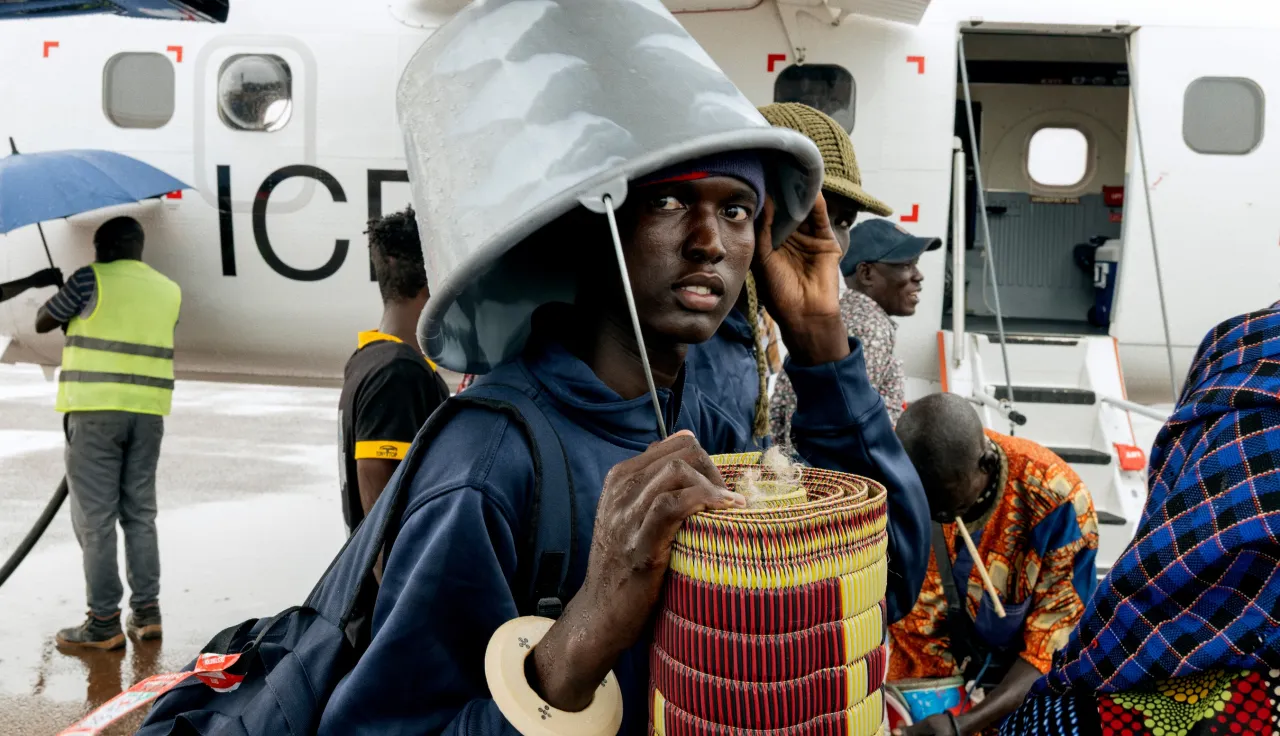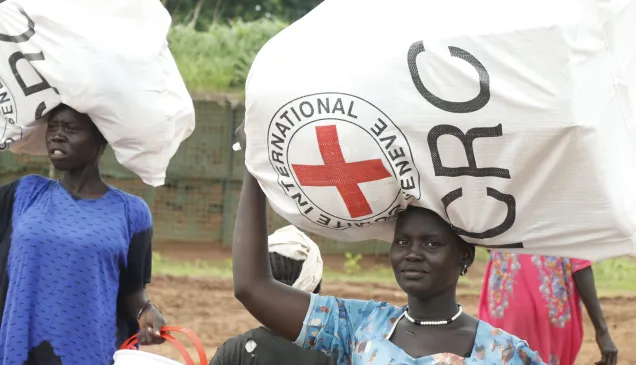Frequently asked questions: ICRC’s work in South Sudan

The International Committee of the Red Cross (ICRC) has been present in Juba since the 1980s and opened its delegation in South Sudan in 2011.
The ICRC works to ensure that people affected by armed conflict and other situations of violence are protected in accordance with international humanitarian law (IHL) and other applicable rules. We help separated families to restore or maintain contact with their relatives and support the families of missing persons in the search for their loved ones. We visit detainees to ensure humane treatment and decent conditions of detention and work to increase knowledge of IHL among the authorities and weapon bearers.
The ICRC also endeavours to provide communities affected by armed conflict with access to safe water, medical care, physical rehabilitation services, mental health and psychosocial support, emergency relief, and livelihood support. We work closely with and support the South Sudan Red Cross (SSRC).
Information for people affected by armed conflict
-
In South Sudan, we provide communities affected by armed conflict with medical care, physical rehabilitation services, access to safe water, emergency relief, and livelihood support, as well as mental health and psychosocial support.
We also help separated families restore or maintain contact with their relatives and support the families of missing persons in their search for loved ones. In addition, we visit detainees to monitor their treatment and living conditions.
At the same time, we continue to promote respect for international humanitarian law (IHL).
-
We recognize the immense needs across South Sudan, and we are committed to helping as many people as we can. Our teams in Juba, Wau, Malakal, Leer, and Yei do their utmost to reach vulnerable communities across the country every day.
We cannot be in all areas of the country because we must prioritize areas most affected by armed conflict while ensuring that our teams can do their work safely. Ensuring a balance between the security conditions we operate in, and the increasing needs of the population is never an easy task.
Learn more about the impact of our work in South Sudan by visiting this page for key facts and figures.
-
Our work is guided by the principles of humanity, impartiality, independence, and neutrality. The criteria to provide protection activities, aid and services to people affected by conflict are based solely on needs, and without discrimination, whether by religion, ethnicity, gender or political affiliations. We make these decisions independently.
We place affected populations at the center of our approach, recognizing them as the primary experts on their own situations. In our programs, communities are involved from the start. We do our best to consult them during surveys and interviews when assessing who is most affected, what their specific needs are, and who has more challenges.
Their perspectives help shape the design of our services. Once a community is identified as requiring a specific type of protection or assistance, we coordinate with local partners to help verify and monitor that aid is being distributed fairly. Feedback from affected people is always welcome and helps us improve services and ensure that we are not excluding the most vulnerable people.
-
The needs in South Sudan are far greater than any single organization can meet. Our focus, based on our specific mandate, is on making the best use of available resources to ensure timely, life-saving care for those affected by armed conflict. The ICRC prioritizes supporting existing health facilities where the impact is greatest, rather than building new hospitals. Our support includes medical supplies, technical and financial assistance, and the deployment of mobile surgical teams when needed.
We currently assist Juba Military Hospital, where hundreds of surgical operations are performed each year. In 2025, we also assisted hospitals in Renk and Akobo. Together with the SSRC, we train health workers, volunteers, and communities in first aid. At the same time, we remind parties to the conflict of their obligations under IHL regarding the protection of patients, healthcare workers, and healthcare facilities in conflict zones.
-
Alongside strengthening the healthcare system to benefit as many people as possible, we work closely with the SSRC to carry out medical evacuations for the war-wounded when security conditions allow. These evacuations ensure that the wounded can reach urgent medical care, especially in areas where travel by road is impossible or unsafe due to conflict, flooding, or other challenges.
We evacuate weapon-wounded patients across South Sudan and transfer them to hospitals where they can receive life-saving treatment. All operations are conducted by medical personnel, using medical transport.
-
Being separated from a loved one without knowing their fate or whereabouts is one of the most difficult situations any family can endure. People have the right to know what happened to their missing relatives and to be informed about the progress of the search.
In collaboration with the SSRC, we can help clarify the fate and whereabouts of missing persons. Together, we work to restore and maintain contact between separated family members.
If you are in South Sudan and searching for a missing person, please contact us by:
- Calling our numbers: +211 (0) 912 170 275; ICRC RFL hotline: +211 (0) 928 016 027, +211 (0) 912 180 112
- Visiting our local offices during working hours (8:00 am – 4:30 pm)
- Sending us an email to jub_tracing_services@icrc.org
- Approaching your closest South Sudan Red Cross office or volunteers
- If you are outside South Sudan, please contact your local Red Cross or Red Crescent or ICRC office. You can find a directory here.
Please note that we rely on information provided by parties to the conflict and the authorities. We compile inquiries and continue discussions with all parties to clarify the fate of individuals. This process may take time due to the complexity of the situation.
We will contact you as soon as we have substantial information to share. We understand how difficult it is to wait for news and regret any delays. Thank you for your patience and understanding.
-
We visit places of detention to check how detainees are treated and whether conditions meet international standards. Our goal is simple: to ensure that people deprived of liberty are treated with dignity and humanity.
We speak with detainees, assess their situation, and work with the authorities to address gaps, for example, by supporting better health services, safer living conditions, and improving the management of the facilities. We also help detainees maintain or restore contact with their families, which is often a vital step in reducing the suffering caused by separation.
We continue our dialogue with authorities and parties to the conflict to visit all places of detention in South Sudan.
Other useful information
-
Neutrality and impartiality are closely linked, but they are not the same. Both are essential to our ability to work in armed conflict and other situations of violence.
Impartiality means we help people solely based on their needs, without discrimination as to class, race, nationality, religion, or political beliefs. We give priority to the most urgent cases.
Neutrality means we do not take sides in a conflict or get involved in political, religious, or ideological debates. In practice, this means avoiding any action that could help or harm one party over another.
Neutrality allows us to earn the trust of all sides, making it possible to cross frontlines to evacuate the wounded, deliver food and medicines, or help families recover the remains of their loved ones.
-
For the ICRC, confidentiality means engaging discreetly with all sides in a conflict, not to legitimize them, but to meet urgent humanitarian needs. By keeping these dialogues private, we avoid politicizing humanitarian issues and protect our neutrality.
Ultimately, confidentiality is what allows us to build trust, gain access to people in need, and ensure the safety of both our staff and the communities we assist.
More information on confidentiality, see this article: Confidentiality Q&A
-
The ICRC and the South Sudan Red Cross Society (SSRC) are both part of the International Red Cross and Red Crescent Movement and guided by the same Fundamental Principles. We work closely together, but our roles differ.
The South Sudan Red Cross focuses on humanitarian activities within South Sudan, including health services, disease prevention, and social welfare. The ICRC, by contrast, has an international mandate to protect and assist people affected by armed conflict and other situations of violence.
The SSRC is the ICRC’s primary partner in South Sudan. Together, they complement each other to reach people affected by conflict quickly, effectively, and in line with humanitarian principles. Our joint programmes include emergency medical care, evacuations, tracing missing persons, restoring family links, and distributing relief items. At all times, the ICRC respects the SSRC’s independence and strategic priorities.
Please visit this page on the South Sudan Red Cross website to read more about their work in South Sudan.
-
To explore the various ways you can join the ICRC, please read this article. You can also view current job openings here and stay updated on the latest vacancies.
Each listing includes details on the role, required qualifications, the E-recruitment system to use, and application deadlines.
Recruitment is carried out through a competitive, merit-based process that ensures transparency and the selection of the most suitable candidates.
-
International humanitarian law (IHL), also known as the laws of war, is a set of international rules that regulate armed conflict. It applies only during armed conflicts, regardless of the cause, but does not address the legality of using force.
IHL aims to protect people who are not, or are no longer, taking part in hostilities, such as civilians, the wounded, and prisoners of war, and to safeguard civilian objects. It also limits the means and methods of warfare available to the parties to a conflict. Serious violations, such as deliberately targeting civilians, may amount to war crimes.
The primary responsibility to respect and ensure respect for IHL lies with states. However, the ICRC, and other organizations, also play a key role in promoting adherence and monitoring compliance.
To know more, visit this article: Frequently asked questions: Rules of war
Take care before you share
If you come across content online that you believe to be false or misleading, you can report it directly to the social media platform.
You can also help slow the spread of misinformation by checking the veracity of questionable information before sharing it with others.
We strive to treat you with respect and dignity
All services provided by the ICRC are free.
Everyone who works with the ICRC (our staff, partners, and suppliers) must always treat you with respect and dignity.
It is forbidden for ICRC employees and our partners to ask for money or any type of favours in exchange for aid. We encourage all to report in good faith suspicion of fraud, corruption, sexual exploitation and abuse, sexual harassment and other suspected misconduct.
You have the right to report cases of inappropriate behaviour or illegal actions on the part of the ICRC.
To do so, you can email us at code_of_conduct@icrc.org. You can also report it directly in the Integrity Line (available in English, French and Spanish).



